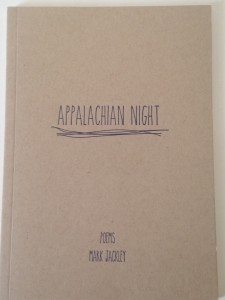By Karen Biscopink
 Minutes after sitting down with Mark Jackley’s new chapbook, Appalachian Night, the power went out in my neighborhood. I completed the required activities: lit our decorative candles; searched for a never-used flashlight, buried somewhere during the recent move; veered between spooky panic and romanticism. Deciding to move forward with my planned reading was a fantastic decision on all counts. In fact, the first poem (“Appalachian Night”), begins, “Enfolded by pure darkness / a train slips through the hills.”
Minutes after sitting down with Mark Jackley’s new chapbook, Appalachian Night, the power went out in my neighborhood. I completed the required activities: lit our decorative candles; searched for a never-used flashlight, buried somewhere during the recent move; veered between spooky panic and romanticism. Deciding to move forward with my planned reading was a fantastic decision on all counts. In fact, the first poem (“Appalachian Night”), begins, “Enfolded by pure darkness / a train slips through the hills.”
The literal darkness of this poem moves throughout Jackley’s collection, reiterating itself each time it appears. In “Appalachian Night,” homes seen from afar are described as “leaking garish light” while the mysterious night train, slipping by unseen, provides a sense of desire to a lonely man in the poem. Several pages later, darkness reappears, now as an agent of disorientation:
Just divorced.
I follow my heart,
blind men bumping in the dark.
(“First Night in a Strange New House”)
A clever, comical poem, “Dog Days,” plants a new stake in the ground with, “The summer storm that blastedthrough like a psycho-killer / … has left us without power.” The temporary loss of power, and loss of unnatural light, is cause for an animalistic celebration:
it’s perfectly fine, why not, the TV is out and the stereo too
and both PCs, oh honey, let us do as they knew to do
when our ancestors grunted and dropped from trees
and barbecued dinosaurs. I can almost remember the darkness,
what roamed its edge and howled.
Jackley’s movements between these visions are never haphazard. Nor are his transitions between poems that differ vastly in tone and prosody. Longer narrative pieces appear alongside others that are tight, metaphorical:
in the parking lot one starling
on the wire like a
period
(“Last Visit to the Home”)
Additionally, a thread of implied personal history is delicately woven between more observational, voyeuristic scenes. For example, we encounter deeply intimate moments as in “First Night” (cited above), but the poet complicates this Appalachian night by offering interludes of distance:
What Indiana Jones will find these hieroglyphics of
cowboy boots shuffling
to Conway and Loretta?
What British Museum will speak for
the nervous man who stuttered,
“Jen, care to dance?”
(“Marks on the Floor of the Ruritan Club”)
At the risk of sounding reductive, I’ll readily admit that one of my chief affections for this chapbook is its title. Appalachian Night points to a single evening in a very tangible location; the verdant landscape of Jackley’s poetry heightens in its appeal when understood as having arisen from such confined parameters. In the acknowledgements section, the author mentions that many of these pieces originally appeared in other collections, but it’s hard to imagine them living anywhere else.
The power did not come on until long after I had finished Appalachian Night, which felt appropriate, more than a little synchronous. This is a book to be read in near darkness and savored.
Mark Jackley’s “You Only Nodded When I Said I’d Heard Your Ex Had Cancer” appeared in Issue 2 of YIV. Appalachian Night was printed by a letterpress shop and is available free to anyone who’d like a copy. Just email Mark at chineseplums@gmail.com.









